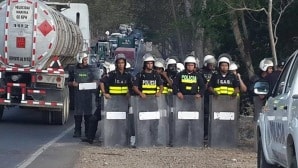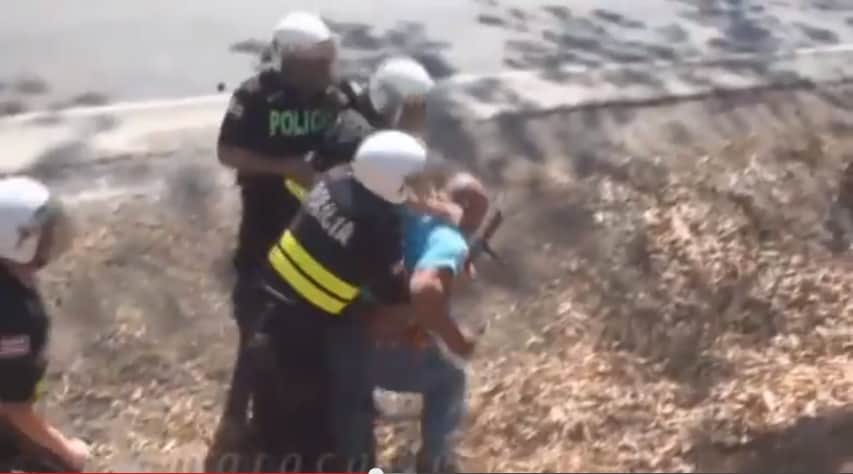First in a series. Read the second story here.
A peaceful protest over land rights in Costa Rica’s maritime zone sparked a violent backlash from police on the Pacific coast last Monday, as anti-riot officers used tear gas to remove dozens of protesters from the Inter-American Highway in Puntarenas.
Following the incident, protesters armed with video clips taken on their cellphones and by local journalists accused police of using excessive force, and the group behind the demonstration is now demanding an investigation.
The faceoff took place in Chomes, Puntarenas, 127 kilometers northwest of the capital, as coastal residents organized by the National Front for Coastal Communities (Frente Nacional de Comunidades Costeras, in Spanish) blocked a road with tree branches, rocks and other debris, causing traffic to snare for several kilometers.
The residents are calling for passage of a Coastal Community Land Bill, known by its Spanish acronym TECOCOS, which has stalled in the Legislative Assembly for several months. TECOCOS aims to resolve an ongoing conflict over Costa Rica’s Maritime Zone Law, which mandates the removal of homes and businesses located within the coastal maritime zone, an area 150 meters from the high tide line on both the Pacific and Caribbean coasts.
TECOCOS would allow thousands of Costa Ricans who have lived and worked in the maritime zone for several years to keep their homes and businesses.
According to members of the front, lawmakers from the ruling National Liberation Party broke a promise to pass TECOCOS, opting instead to move forward two bills drafted by the Chinchilla administration. Protesters say the PLN had agreed to pass TECOCOS in a first round of debate in the Assembly last June, along with the two government-sponsored bills, but that never happened.
On Feb. 17, PLN lawmakers filed a motion to exclude the TECOCOS bill and vote only on the government’s two bills. A spokeswoman for Presidency Minister Carlos Benavides told The Tico Times that lawmakers have no plans to call TECOCOS up for discussion.
The front responded by rallying dozens of protesters – from teenagers to the elderly – who gathered in the hot Pacific sun last Monday in front of a Puntarenas gas station. When protesters blocked the two-lane highway, snaring traffic, the situation turned ugly.
Anti-riot police moved in, firing tear gas and smoke bombs to clear the road. Choking on the gas, several protesters fled to the nearby gas station and an adjacent restaurant, where they say they were attacked by police. Eleven people were arrested.
This week, resident Stella Chinchilla filed a complaint with the Ombudsman’s Office in which she accused police of using excessive force, including allegedly attacking a 75-year-old Costa Rican man named Ignacio Velásquez.

Heating up
Wilmar Matarrita, coordinator of the National Front of Coastal Communities, told The Tico Times he has evidence “protesters were not the aggressors,” but rather “victims of police brutality.”
Matarrita said he collected testimony from local property owners, a restaurant owner, a gas station owner and the director of a local health clinic.
National Police Assistant Director Pablo Bertozzi defended the police action, telling The Tico Times that the use of force was necessary after talks with the protesters failed. According to Bertozzi, traffic on the major highway had backed up 10 kilometers, and police asked demonstrators to clear both lanes. Protesters agreed to open one lane. That’s when police moved in.
Bertozzi also claimed that when police attempted to remove debris from the road, demonstrators attacked them.
“Police officers were obligated to respond using chemical agents [tear gas] in order to remove the protesters and establish order. As a result, 11 people were arrested, one of whom had attacked a police officer with a weapon. Police were physically attacked,” Bertozzi said.
Members of the front countered by saying that police officers “attacked” women and seniors, and chased demonstrators who were trying to run from the scene.
On Wednesday, the Ombudsman’s Office asked the Public Prosecutor’s Office to open an investigation of the incident. The office also asked Public Security Minister Mario Zamora to issue a detailed report justifying the use of force.
Bertozzi said his staff is compiling the information requested by the Ombudsman’s Office and will respond to the allegations.
“If someone believes the police used excessive force, they should go to the appropriate agencies and file an administrative complaint. We will take those complaints seriously and investigate them objectively,” Bertozzi said.
Meanwhile, Matarrita called on members of the Higher Education Council of the University of Costa Rica to denounce the alleged abuse, and said that organizers planned another demonstration in coming days.
“We’re going to protest again in order to force a national debate on maritime coastal zones,” Matarrita said. “But members of our communities are not going to return to the street unprotected and without national support. We’re going to protest peacefully and we’re going to use all legal means available to us.”
Watch a documentary video of the conflict (in Spanish) here:
Read a Spanish version of this story here.






